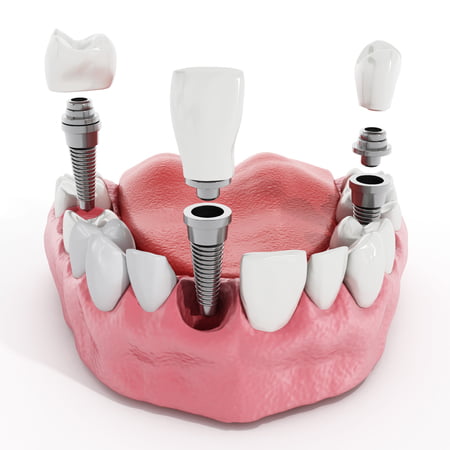If you have missing teeth, you may find it difficult to chew your favorite foods, you may feel very self-conscious when you smile or avoid smiling at all, or you may even find it difficult to speak clearly. In the past, dentures were the only solution if you had multiple missing teeth but, thanks to modern technology, it’s now possible to replace one or more missing teeth with dental implants. If you’re considering upgrading your smile, here are seven reasons why you should choose dental implants.
- Table of Contents hide
A long-lasting replacement for missing teeth.
People lose their teeth for many reasons, from cavities and periodontal disease to injury and trauma, medical conditions, bone loss or even through the failure of previous dental work. Dental implants create a strong foundation for one or more dental crowns to leave you with strong, natural-looking teeth that will allow you to eat, talk and smile with confidence.

No more bridges, dentures, and adhesives
Until recently, the only options available to replace missing teeth were either a fixed bridge or removable dentures. While these have proved successful treatment options, dental implants are a far more permanent, secure and natural-looking form of tooth replacement. With dental implants, it’s possible to create a full arch of prosthetic teeth, with a few as four posts. There’s no more reliance on denture adhesives and the worry that your teeth will move at an inopportune time, and you don’t have to take them out for bed!
Just beautiful, strong, natural looking teeth
While some dentures can look obvious, dental implants give you very natural looking teeth. You don’t have to take them out for cleaning or worry about eating certain foodstuffs, plus you care for them just as you would your natural teeth with regular brushing and flossing.
Related Article: Are All Dentures Created Equal? – Denture Basics
Dental implants prevent your teeth from moving into the gap
Once you’ve lost a tooth, the adjacent teeth will start to move, until they eventually fill in the gap left. This shifting may not only cause problems that will require orthodontic treatment in the future, but unevenly spaced or crowded teeth are much harder to keep clean. By filling the gap with a dental implant, you’ll ensure that your teeth are evenly spaced and much easier to clean.
Dental implants help to conserve your jawbone
If you lose a tooth, the jawbone will start to deteriorate under the missing tooth. Even if you choose to get a fixed bridge or non-implant supported dentures to replace the missing tooth or teeth, this will still happen as the bone no longer receives adequate stimulation from the tooth root. However, it doesn’t mean to say that you can’t have implants if you’ve had a missing tooth for an extended period, but it may require a dental bone graft to achieve this. If you’ve been told in the past that you’re not a suitable candidate for dental implants, contact dental implant expert Dr. Tom Munroe at Milltown Dental Clinic.

Dental implants help to preserve your facial appearance
While we need our teeth to eat, they also give structure and form to the face. Many people who wear dentures complain of sunken cheeks and thin lips due to the deterioration of the jawbone, which not only adds years to the face but may cause issues with lack of confidence. By choosing dental implants, your jawbone will receive the stimulation it needs to stay healthy and to keep the contours of your face full.
Dental implants are easy to maintain and will last for years
Dental implants not only spell an end to cavities in the replacement teeth, but they’re easy to maintain and function just like your own teeth. And, providing you give them the care and attention they need, they’ll last for years.
Contact your local dental implant expert now
If you’d like to find out more about dental implants and how they could benefit your smile, get in touch with your local dental implant expert now.
Disclaimer: All images are provided by the author.
About Author:
 Dr. Thomas Munroe of Milltown Dental Clinic graduated in 2001 from Trinity College Dublin. He has a wide range of expertise in various dental practices. Initially, he started working in a private dental clinic in Kent, England before he returned back home to Ireland to work for the HSE as a health board dentist in Tallaght.
Dr. Thomas Munroe of Milltown Dental Clinic graduated in 2001 from Trinity College Dublin. He has a wide range of expertise in various dental practices. Initially, he started working in a private dental clinic in Kent, England before he returned back home to Ireland to work for the HSE as a health board dentist in Tallaght.




